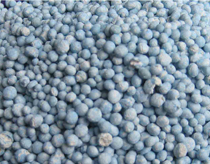Paradox named nitrogen
Scientists once again set up an alarm about new harms to global climate and humanity. It is nitrogen, an extremely necessary element for life.
For years, scientists have been constantly warning about the harmful effects of carbon - especially carbon dioxide (CO 2 ) - on global warming.
'The public knows a lot about carbon and its role in the greenhouse effect. However, we know less about nitrogen and its effects on the environment, including climate change, 'said James Galloway, a chemical expert at the University of Virginia (USA).
Pure nitrogen (N) is the colorless, odorless, tasteless and gas-rich gas in the Earth's atmosphere. Each of our breaths contains about 80% of this element.

A fertilizer containing N. Photo: alibaba.com.
However, nitrogen molecules (N 2 ) are quite inert, so only about 1% participate in chemical reactions. It is called 'active nitrogen'. It combines with other elements, such as oxygen and hydrogen, to form tens of thousands of chemical compounds that are both beneficial and harmful. Many compounds are used in industry and agriculture. They help people preserve food and alcohol; increase crude oil extraction efficiency; production of plastic, explosives, stainless steel, liquid fuel for missiles; electronic components manufacturing. N produces DNA, genes and proteins. They are most used in chemical fertilizer production.
'We estimate fertilizer containing N is feeding about 48% of the global population , ' Galloway said.
But 'N activity' also causes many negative effects. Its compounds create smog, cause cancer and many respiratory diseases. N fouling rivers, lakes, bays and seas. It creates 'dead zones' on the ocean, ravages roads and bridges, weakens the ozone layer and worsens global warming.
Scientists call the need for good and bad face balances of active nitrogen as 'nitrogen paradox'.
'The paradox is that N is essential for human existence, but it also causes harmful effects on people and ecosystems. Our biggest challenge is to promote the beneficial effects of N, while minimizing its negative aspects , 'explains Galloway.
Some parts of the world, such as Africa, are suffering countless consequences because there are too few Ns, leading to crop failures and desertification. Meanwhile, the atmosphere of developed countries contains too many of these elements.
Meanwhile, the amount of active N is increasing at an alarming rate.
'Human activity causes the rate of activity of N activity to double that of the past. This change has just happened recently but it happened very quickly. The acceleration in N's cycle is one of the most frightening and most pressing threats to global climate change , 'said Alan Townsend, director of the North American Nitrogen Center of the University of Colorado (USA). ), stated.
- Crazy with paradoxes 'quiz you prove'
- The dish containing liquid nitrogen punctured the baby's stomach
- What happens if you fall into a liquid nitrogen tank?
- The truth behind three 1,000-year paradoxes no one could solve
- Advantages and disadvantages when pumping tires with nitrogen
- This is the answer to Zeno's famous paradox, about the Achilles hero racing against the turtle
- Testing dropping a liquid nitrogen tank into water: What happened next surprised everyone!
- Discover how liquid nitrogen destroys everything
- The 'strange' thing happens when gasoline and liquid nitrogen meet
- Nitrogen fixation: relationship between plants and bacteria (Part 1)
- The paradox of self-liberating victims when they are about to freeze to death
- Artworks made of liquid nitrogen
 Is the magnetic North Pole shift dangerous to humanity?
Is the magnetic North Pole shift dangerous to humanity? Washington legalizes the recycling of human bodies into fertilizer
Washington legalizes the recycling of human bodies into fertilizer Lightning stone - the mysterious guest
Lightning stone - the mysterious guest Stunned by the mysterious sunset, strange appearance
Stunned by the mysterious sunset, strange appearance